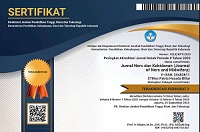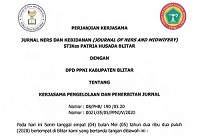Pengaruh Durasi Terdiagnosa Kanker terhadap Sub Skala Primer Strategi Koping Pasien Kanker
DOI:
https://doi.org/10.26699/jnk.v6i3.ART.p348-356Keywords:
Durasi Terdiagnosa Kanker, Sub Skala Primer, Strategi Koping, KankerAbstract
Diagnosa penyakit kanker dipersepsikan oleh sebagian besar orang sebagai penyakit yang berbahaya dan mematikan. Respon penolakan, cemas, depresi dan ketakutan menjadi dominan, sehingga memengaruhi individu dalam menentukan strategi koping untuk mengatasi masalah pasca terdiagnosa kanker. Tujuan penelitian membuktikan adanya pengaruh durasi terdiagnosa kanker terhadap sub skala primer strategi koping pasien kanker. Desain yang digunakan cross sectional. Populasinya adalah pasien kanker dengan kesadaran composmentis di Yayasan Kanker Indonesia Cabang Jawa Timur yang berjumlah 32 orang, diambil dengan teknik total sampling. Instrumen yang digunakan yaitu Coping Strategies Inventory Short Form (CSI-S). Uji statistik dengan regresi ordinal dilakukan pada variabel durasi terdiagnosa kanker terhadap 8 sub skala primer dan didapatkan 6 sub skala memiliki p < 0.05 yaitu sub skala pemecahan masalah, restrukturisasi kognitif, ekspresi emosi, penghindaran masalah, pikiran angan, dan self criticsm, sedangkan sub skala kontak sosial dan isolasi sosial tidak memiliki hasil yang signifikan p > 0.05. Durasi terdiagnosa kanker < 1 tahun lebih dominan terhadap strategi koping akibat reaksi penolakan, sedangkan diagnosa kanker > 1 tahun lebih adaptif terhadap sakitnya, sehingga strategi koping yang diambilpun lebih adaptif pula. Durasi terdiagnosa kanker dapat memengaruhi respon psikologis individu yang berdampak terhadap pengambilan keputusan strategi koping terhadap masalah yang dihadapi.
Â
Cancer is perceived by most people as a dangerous disease. The anxiety, depression and fear becomes dominant so it affects individuals in determining coping strategies in overcoming post-diagnosed cancer. The aim was to prove the effect of cancer diagnosed duration on primary sub-scale coping strategies in cancer patients. This study used cross sectional design. The population was composmentis cancer patients at Cancer Foundation Indonesia Branch in East Java, Surabaya. The samples were 32 respondents taken by total sampling method. The instrument used the Coping Strategies Inventory Short Form. Statistical tests by ordinal regression was done on variable duration diagnosed with cancer in 8 primary sub-scales and obtained 6 sub-scales having p <0.05, consist of problem solving, cognitive restructuring, emotional expression, problem avoidance, mind thinking, and self criticsm. Sub-scales social contact and social isolation did not have significant results p > 0.05. The duration of cancer diagnosed less than 1 year was more dominant in coping strategies due to rejection reactions, while more than 1 year was more adaptive to the illness situation and coping strategies taken was more adaptive too. The duration of cancer diagnosed can affect the psychological response of an individual that has an impact on decision-making on coping strategies on the problems faced.
References
Arndt J, Cook A, Goldenberg JL, Cox CR. Cancer and the threat of death: The cognitive dynamics of death-thought suppression and its impact on behavioral health intentions. J Pers Soc Psychol [Internet]. 2007 Jan [cited 2019 Apr 24];92(1):12–29. Available from: http://www.ncbi.nlm.nih.gov/pubmed/17201539
Robinson D, Renshaw C, Okello C, Møller H, Davies EA. Suicide in cancer patients in South East England from 1996 to 2005: a population-based study. Br J Cancer [Internet]. 2009 Jul 26 [cited 2019 May 2];101(1):198–201. Available from: http://www.nature.com/articles/6605110
Oates JR, Maani-Fogelman PA. Nursing Grief and Loss. 2019 Jan 19 [cited 2019 Apr 24]; Available from: https://www.ncbi.nlm.nih.gov/books/NBK518989/
Kutner JS, Kilbourn KM. Bereavement: Addressing Challenges Faced by Advanced Cancer Patients, Their Caregivers, and Their Physicians. Prim Care Clin Off Pract [Internet]. 2009 Dec [cited 2019 Apr 24];36(4):825–44. Available from: https://linkinghub.elsevier.com/retrieve/pii/S0095454309000700
Bray F, Ferlay J, Soerjomataram I, Siegel RL, Torre LA, Jemal A. Global cancer statistics 2018: GLOBOCAN estimates of incidence and mortality worldwide for 36 cancers in 185 countries. CA Cancer J Clin [Internet]. 2018 Nov [cited 2019 May 2];68(6):394–424. Available from: http://www.ncbi.nlm.nih.gov/pubmed/30207593
Badan Penelitian dan Pengembangan Kesehatan. Hasil Utama Riskesdas 2018. Jakarta; 2018.
Güner P. Three Phases of Cancer in the Process of Mental Trauma: Diagnosis, Treatment, Survival. J Psychiatr Nurs [Internet]. 2017 [cited 2019 Apr 24]; Available from: http://www.phdergi.org/jvi.aspx?pdir=phd&plng=tur&un=PHD-79663
Costa-Requena G, Cantarell-Aixendri MC, Parramon-Puig G, Serón-Micas D. Dispositional optimism and coping strategies in patients with a kidney transplant. Nefrol (English Ed [Internet]. 2014 Sep 1 [cited 2019 May 2];34(5):605–10. Available from: https://www.revistanefrologia.com/en-dispositional-optimism-coping-strategies-in-patients-with-kidney-transplant-articulo-X2013251414054589
Adler NE, Page A (Ann EK., Institute of Medicine (U.S.). Committee on Psychosocial Services to Cancer Patients/Families in a Community Setting. Cancer Care for the Whole Patient : Meeting Psychosocial Health Needs. National Academies Press; 2008. 429 p.
Ness S, Kokal J, Fee-Schroeder K, Novotny P, Satele D, Barton D. Concerns Across the Survivorship Trajectory: Results From a Survey of Cancer Survivors. Oncol Nurs Forum [Internet]. 2013 Jan 1 [cited 2019 Apr 24];40(1):35–42. Available from: http://www.ncbi.nlm.nih.gov/pubmed/23269768
Foley KL, Farmer DF, Petronis VM, Smith RG, McGraw S, Smith K, et al. A qualitative exploration of the cancer experience among long-term survivors: comparisons by cancer type, ethnicity, gender, and age. Psychooncology [Internet]. 2006 Mar [cited 2019 Apr 24];15(3):248–58. Available from: http://www.ncbi.nlm.nih.gov/pubmed/15940742
Mehrabi E, Hajian S, Simbar M, Hoshyari M, Zayeri F. Coping response following a diagnosis of breast cancer: A systematic review. Electron physician [Internet]. 2015 Dec 20 [cited 2019 May 2];7(8):1575–83. Available from: http://www.ncbi.nlm.nih.gov/pubmed/26816583
Khalili N, Farajzadegan Z, Mokarian F, Bahrami F. Coping strategies, quality of life and pain in women with breast cancer. Iran J Nurs Midwifery Res [Internet]. 2013 Mar [cited 2019 Apr 24];18(2):105–11. Available from: http://www.ncbi.nlm.nih.gov/pubmed/23983738
Maghan M, Maghan M. Problem Solving Style and Coping Strategies: Effects of Perceived Stress. Creat Educ [Internet]. 2017 Nov 8 [cited 2019 Apr 28];8(14):2332–51. Available from: http://www.scirp.org/journal/doi.aspx?DOI=10.4236/ce.2017.814160
Lee J, Chee I-S. PS241. Problem solving style, stress, anxiety and depression. Int J Neuropsychopharmacol [Internet]. 2016 Jun [cited 2019 Apr 28];19(Suppl_1):88–88. Available from: http://academic.oup.com/ijnp/article/19/Suppl_1/88/2946575/PS241-Problem-solving-style-stress-anxiety-and
Heppner PP, Armer JM, Mallinckrodt B. Problem-solving style and adaptation in breast cancer survivors: a prospective analysis. J Cancer Surviv [Internet]. 2009 Jun [cited 2019 Apr 24];3(2):128–36. Available from: http://www.ncbi.nlm.nih.gov/pubmed/19396549
Creswell JD, Dutcher JM, Klein WMP, Harris PR, Levine JM. Self-affirmation improves problem-solving under stress. PLoS One [Internet]. 2013 [cited 2019 Apr 28];8(5):e62593. Available from: http://www.ncbi.nlm.nih.gov/pubmed/23658751
Diamond A. Executive Functions. Annu Rev Psychol [Internet]. 2013 Jan 3 [cited 2019 Apr 28];64(1):135–68. Available from: http://www.annualreviews.org/doi/10.1146/annurev-psych-113011-143750
Sliwinski MJ, Smyth JM, Hofer SM, Stawski RS. Intraindividual coupling of daily stress and cognition. Psychol Aging [Internet]. 2006 Sep [cited 2019 Apr 30];21(3):545–57. Available from: http://www.ncbi.nlm.nih.gov/pubmed/16953716
Aggarwal NT, Wilson RS, Beck TL, Rajan KB, Mendes de Leon CF, Evans DA, et al. Perceived Stress and Change in Cognitive Function Among Adults 65 Years and Older. Psychosom Med [Internet]. 2014 Jan [cited 2019 Apr 30];76(1):80–5. Available from: http://www.ncbi.nlm.nih.gov/pubmed/24367123
Jean-Pierre P, Winters PC, Ahles TA, Antoni M, Armstrong FD, Penedo F, et al. Prevalence of self-reported memory problems in adult cancer survivors: a national cross-sectional study. J Oncol Pract [Internet]. 2012 Jan [cited 2019 May 1];8(1):30–4. Available from: http://www.ncbi.nlm.nih.gov/pubmed/22548008
Boyes AW, Girgis A, D’Este CA, Zucca AC, Lecathelinais C, Carey ML. Prevalence and Predictors of the Short-Term Trajectory of Anxiety and Depression in the First Year After a Cancer Diagnosis: A Population-Based Longitudinal Study. J Clin Oncol [Internet]. 2013 Jul 20 [cited 2019 Apr 24];31(21):2724–9. Available from: http://ascopubs.org/doi/10.1200/JCO.2012.44.7540
Osborn RL, Demoncada AC, Feuerstein M. Psychosocial Interventions for Depression, Anxiety, and Quality of Life in Cancer Survivors: Meta-Analyses. Int J Psychiatry Med [Internet]. 2006 Mar 23 [cited 2019 Apr 24];36(1):13–34. Available from: http://www.ncbi.nlm.nih.gov/pubmed/16927576
Conley CC, Bishop BT, Andersen BL. Emotions and Emotion Regulation in Breast Cancer Survivorship. Healthc (Basel, Switzerland) [Internet]. 2016 Aug 10 [cited 2019 Apr 24];4(3). Available from: http://www.ncbi.nlm.nih.gov/pubmed/27517969
Garlick M, Wall K, Corwin D, Koopman C. Psycho-Spiritual Integrative Therapy for Women with Primary Breast Cancer. J Clin Psychol Med Settings [Internet]. 2011 Mar 23 [cited 2019 Apr 24];18(1):78–90. Available from: http://www.ncbi.nlm.nih.gov/pubmed/21344265
Henselmans I, Helgeson VS, Seltman H, de Vries J, Sanderman R, Ranchor A V. Identification and prediction of distress trajectories in the first year after a breast cancer diagnosis. Heal Psychol [Internet]. 2010 [cited 2019 Apr 24];29(2):160–8. Available from: http://doi.apa.org/getdoi.cfm?doi=10.1037/a0017806
Stanton AL. What Happens Now? Psychosocial Care for Cancer Survivors After Medical Treatment Completion. J Clin Oncol [Internet]. 2012 Apr 10 [cited 2019 Apr 24];30(11):1215–20. Available from: http://www.ncbi.nlm.nih.gov/pubmed/22412133
Buiting HM, van Ark MAC, Dethmers O, Maats EPE, Stoker JA, Sonke GS. Complex challenges for patients with protracted incurable cancer: an ethnographic study in a comprehensive cancer centre in the Netherlands. BMJ Open [Internet]. 2019 Mar 30 [cited 2019 Apr 24];9(3):e024450. Available from: http://www.ncbi.nlm.nih.gov/pubmed/30928932
Lazarus RS. Emotions and interpersonal relationships: toward a person-centered conceptualization of emotions and coping. J Pers [Internet]. 2006 Feb [cited 2019 Apr 24];74(1):9–46. Available from: http://www.ncbi.nlm.nih.gov/pubmed/16451225
Vos MS, Putter H, van Houwelingen HC, de Haes HCJM. Denial and social and emotional outcomes in lung cancer patients: The protective effect of denial. Lung Cancer [Internet]. 2011 Apr [cited 2019 May 2];72(1):119–24. Available from: http://www.ncbi.nlm.nih.gov/pubmed/20705356
Chandra P, Desai G. Denial as an experiential phenomenon in serious illness. Indian J Palliat Care [Internet]. 2007 [cited 2019 Apr 24];13(1):8. Available from: http://www.jpalliativecare.com/text.asp?2007/13/1/8/37184
Henson KE, Brock R, Charnock J, Wickramasinghe B, Will O, Pitman A. Risk of Suicide After Cancer Diagnosis in England. JAMA Psychiatry [Internet]. 2019 Jan 1 [cited 2019 Apr 30];76(1):51. Available from: http://archpsyc.jamanetwork.com/article.aspx?doi=10.1001/jamapsychiatry.2018.3181
Steiner JL, Wagner CD, Bigatti SM, Storniolo AM. Depressive rumination and cognitive processes associated with depression in breast cancer patients and their spouses. Fam Syst Health [Internet]. 2014 Dec [cited 2019 Apr 30];32(4):378–88. Available from: http://www.ncbi.nlm.nih.gov/pubmed/25000223
Whitaker KL, Watson M, Brewin CR. Intrusive cognitions and their appraisal in anxious cancer patients. Psychooncology [Internet]. 2009 Nov [cited 2019 Apr 30];18(11):1147–55. Available from: http://www.ncbi.nlm.nih.gov/pubmed/19140125
Nipp RD, El-Jawahri A, Fishbein JN, Eusebio J, Stagl JM, Gallagher ER, et al. The relationship between coping strategies, quality of life, and mood in patients with incurable cancer. Cancer [Internet]. 2016 Jul 1 [cited 2019 Apr 24];122(13):2110–6. Available from: http://www.ncbi.nlm.nih.gov/pubmed/27089045
Peter Roy-Byrne M. Self-Criticism and Self-Compassion: A Mindfulness Approach. NEJM J Watch [Internet]. 2018 Nov 5 [cited 2019 Apr 24];2018. Available from: https://www.jwatch.org/na47790/2018/11/05/self-criticism-and-self-compassion-mindfulness-approach
Nurasyikin Z, Ihsani MM, . Z, Syed Zulkifli SZ, Nahar Azmi M, Fuad I, et al. Depression, Anxiety, Stress and Perceived Social Support Among Breast Cancer Survivors in Tertiary Hospital in Malaysia. KnE Life Sci [Internet]. 2018 May 17 [cited 2019 May 2];4(4):232. Available from: https://knepublishing.com/index.php/Kne-Life/article/view/2282
Smith SM, Cousins G, Clyne B, Allwright S, O’Dowd T. Shared care across the interface between primary and specialty care in management of long term conditions. Cochrane Database Syst Rev [Internet]. 2017 Feb 23 [cited 2019 May 2];2:CD004910. Available from: http://www.ncbi.nlm.nih.gov/pubmed/28230899
Moore S, Leung B, Bates A, Ho C. Social isolation: Impact on treatment and survival in patients with advanced cancer. J Clin Oncol [Internet]. 2018 Dec 28 [cited 2019 Apr 24];36(34_suppl):156–156. Available from: http://ascopubs.org/doi/10.1200/JCO.2018.36.34_suppl.156






